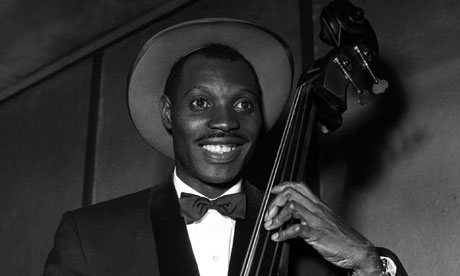Lord Kitchener. Photograph: Popperfoto
When the Empire Windrush docked at Tilbury, a new Britain was born. On board was the first wave of West Indian guest workers, answering a British government advertisement for cheap transport to the mother country to fill the postwar labour shortage.
The seeds of multicultural Britain were duly sown. Further down the line lay the Notting Hill riots of 1958, Joe Harriott at Ronnie Scott’s, the Notting Hill street carnival, the Equals singing Black Skin Blue Eyed Boys, the Clash singing Police and Thieves, football fans throwing bananas at black players, black players becoming international captains, Lenny Henry offering to be repatriated to Dudley, Paul Gilroy’s There Ain’t No Black in the Union Jack, the Brixton and Toxteth riots of 1981, Janet Kay trilling Silly Games on Top of the Pops, Courtney Pine’s Jazz Warriors, the London Community Gospel Choir, the Reggae Philharmonic Orchestra, Benjamin Zephaniah turning down an MBE, pirate radio, natty dread, funki dred, drum’n’bass, dubstep, grime, Dizzie Rascal. All this was to come.
First, though, first came Kitchener. The Windrush, a former German liner popular with the Nazi naval elite, included onboard Lord Kitchener and Lord Beginner, Trinidad’s top calypsonians. Remarkably, when Kitchener disembarked, Pathe News caught the “king of calypso” on camera. Pathe was documenting “The Great British Black Invasion”. Asked to sing, Kitchener didn’t miss a beat. “London is the place for me,” he crooned, “London, this lovely city …” He had yet to experience smog-bound austerity Brixton, whose labour exchange was first port of call for many of Kitchener’s 500 fellow travellers.
“Kitch” worked his own passage, in clubs and pubs. Soon he, Beginner and others were passing comment on national life on record; the 1950 England-West Indies test match was celebrated on Cricket, Lovely Cricket. The 1951 general election and the 1953 coronation followed while closer to home was My Landlady and her demands for rent. With its wit and side order of double entendre – “Oh mister, don’t touch me tomatoes” – calypso fitted easily into the national psyche.
The musical history of multi-racial Britain is usually elided to omit the 50s, jumping to the Jamaican insurgency of the 60s, but in London at least there was a vibrant scene, ranging from the big band swing of Jamaica’s Leslie “Jiver” Hutchinson to the steel band of Trinidadian Russ Henderson. It was a diverse, global mix drawn to the mother country from different parts of the Empire, with jazz providing the lingua franca.
Little documented, the scene was caught by Colin MacInnes in his 1957 novel City of Spades, whose hero is a West African hustler called Johnny Fortune. MacInnes gives us a glimpse of a secret London of nightclubs and shebeens, petty criminals, prostitutes, corrupt cops, outsiders by race, sexuality or choice. It’s a parallel world to the starchy conformism of drab, respectable Britain.
Black America, of course, played its part, but a new, cosmopolitan fusion that spoke specifically to black Britons was under way. More than bananas had come off the banana boats in London’s docks. It was The Banana Boat Song, a Jamaican work chant, that broke calypso to an international audience.
As the 50s teetered into the 60s, calypso was still popular. Like much else, it would be swept aside by pop, R&B, and folk. In particular, there was soul, whose confident, civil rights-tinged modernism offered a new model to black people across the globe. When Sam Cooke sang A Change is Gonna Come, the racial rulebook changed.
Jamaican music was quickest to pick up the new mood of black America, and add its own innovatory ideas to create reggae. When the Notting Hill carnival moved onto the streets in 1966, it was a Trinidadian, calypsonian celebration, though reggae and its sound systems would come to define the event in the 1970s, when the story of Reggae Britannica takes off. First, though, there was Kitch.
For original article: Lord Kitchener steps off the Empire Windrush | Music | The Guardian.
